|
|
|
Sort Order |
|
|
|
Items / Page
|
|
|
|
|
|
|
| Srl | Item |
| 1 |
ID:
084002
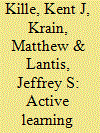

|
|
|
|
|
| Publication |
2008.
|
| Summary/Abstract |
This article reports on the results of a workshop on active teaching and learning sponsored by the Instituto de Relações Internacionais at the University of Brasilia. This 2-day, intensive workshop was designed by the authors to introduce teaching and learning strategies and to promote critical dialogue for professors and advanced students from institutions across Brazil. Details are provided on sessions that addressed the philosophy behind active teaching and learning, resources available for developing and carrying out exercises, a wide range of techniques, and the importance of debriefing and assessment. Finally, the article provides an evaluation of the workshop experience, emphasizing its potential value for training international relations instructors, both within the United States and across other international contexts, on ways to integrate active teaching and learning into their classrooms.
|
|
|
|
|
|
|
|
|
|
|
|
|
|
|
|
| 2 |
ID:
138929
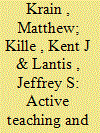

|
|
|
|
|
| Summary/Abstract |
Recent developments in globalization, education, and technology suggest exciting possibilities for cross-national active teaching and learning in international studies. This paper reviews scholarship on the potential for systematic and intentional cross-national pedagogical innovations in international studies. Three critical themes are identified and explored: culture and cross-national education, collaboration across contexts, and the need for systematic assessment. Each plays an important role in facilitating effective active teaching and learning cross-nationally. A broader examination of the opportunities and challenges of cross-national education in international studies suggests guidelines for a systematic, collaborative cross-national approach to an emerging active teaching and learning research agenda.
|
|
|
|
|
|
|
|
|
|
|
|
|
|
|
|
| 3 |
ID:
087370
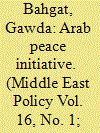

|
|
|
|
|
| Publication |
2009.
|
| Summary/Abstract |
In the second half of the 2000s, several
unprecedented developments in the
Arab-Israeli confl ict have highlighted
the potential of a dramatic alteration
of the Middle East's strategic landscape.
King Abdullah of Saudi Arabia has sponsored
a world conference on dialogue
among various faiths and cultures, including
Islam, Christianity and Judaism. It
opened with a meeting in Madrid, Spain,
in July 2008, and a follow-up session
was held under the auspices of the United
Nations in New York City the following
November. The list of participants in this
latest meeting included the kings of Saudi
Arabia and Jordan; the emirs of Kuwait
and Bahrain; the presidents of Israel, the
United States, Finland, Pakistan and Lebanon;
and the prime ministers of Britain,
Qatar, Morocco, the United Arab Emirates,
Djibouti and Egypt.
|
|
|
|
|
|
|
|
|
|
|
|
|
|
|
|
| 4 |
ID:
131985
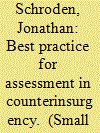

|
|
|
|
|
| Publication |
2014.
|
| Summary/Abstract |
In September 2011, the Commander of the International Security Assistance Force (ISAF) in Afghanistan directed the Afghan Assessment Group to redesign the way in which ISAF was assessing the status of the war, and to be 'revolutionary' in so doing. The resulting assessment paradigm was novel, non-doctrinal, and effectively addressed the unique complexities of the counterinsurgency in Afghanistan and the needs of the ISAF Commander. It had a two-tier structure consisting of both strategic and campaign assessments. The former focused on answering a set of strategic questions in narrative, analytic form to address the strategic environment, while the latter used a set of standards and accompanying narrative responses to gauge accomplishment of campaign tasks. Both tiers captured the current state of the war while maintaining an eye on future challenges and opportunities. The two assessments and their associated processes were designed to stimulate discussions leading directly to decisions by senior leaders on actions they could take, direct, or request. While any assessment paradigm will have advantages and disadvantages, an examination of the pros and cons of this assessment paradigm makes clear that it should be considered a 'best practice' in the field of counterinsurgency assessment.
|
|
|
|
|
|
|
|
|
|
|
|
|
|
|
|
| 5 |
ID:
093487


|
|
|
|
|
| Publication |
2010.
|
| Summary/Abstract |
The last 20 years efforts to find a long-term and large-scale biofuel alternative to petrol and diesel for the transport sector have been intensified with a focus on liquid biofuels, such as ethanol, methanol and Fischer-Tropsh diesel derived from wood. The large-scale production of biomethane has so far largely been overlooked in comparative studies that focus on the long-term renewable options. The aim of this article fills this gap and to provide a broad and systematic assessment of the future potential of biomethane compared to other biofuels. In order to become a large-scale option, biomethane production from woody biomass via gasification needs to be developed and commercialized. However, biomethane exhibits a clear development path with relatively low financial and technical risks starting with local solutions utilizing wet biomass resources towards medium and eventually large-scale gasification with economics similar to liquid second generation biofuels. The disadvantage of being a gaseous fuel is not insurmountable and can furthermore be relaxed by the integration and dual-use of the existing distribution system for natural gas. This assessment concludes that more emphasize should be given to biomethane as a large-scale option given the opportunity to use woody biomass from gasification.
|
|
|
|
|
|
|
|
|
|
|
|
|
|
|
|
| 6 |
ID:
170406
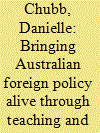

|
|
|
|
|
| Summary/Abstract |
If we are to help students develop opinions and perspectives on world politics, and understand at the same time what it means to hold these opinions and perspectives in the Australian context, we need to bring the world to the classroom. Information overload has led to feelings of alienation among students, and the way we teach needs to instil in students a sense that they are stakeholders in Australian foreign policy, and help them develop strategies for incorporating the complex information environment into their learning. In this short piece I propose two forms of assessment that authentically place the focus on these learning outcomes.
|
|
|
|
|
|
|
|
|
|
|
|
|
|
|
|
| 7 |
ID:
138927
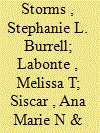

|
|
|
|
|
| Summary/Abstract |
This article examines a multiyear project funded by the Teagle Foundation to assess student learning in humanitarian studies. It explores outcomes derived from developing a collaborative learning approach to humanitarian action that emphasizes both cross-campus and cross-institutional peer-to-peer learning and exchange. Faculty, staff, and students from Fairfield, Fordham, and Georgetown Universities worked together as members of the Jesuit Universities Humanitarian Action Network (JUHAN) to design an innovative and comprehensive assessment process for curricular programs in humanitarian studies, as well as courses with significant humanitarian content. In particular, we focus on the value of establishing cognitive and affective learning objectives, developing tools and methods to assess learning (for example, rubrics and vignettes), demonstrating use of these tools through piloting and data analysis, and closing the assessment “loop.” As the first of its kind assessment strategy for humanitarian studies at the undergraduate level, we argue that these efforts make important inroads in establishing a common baseline for measuring learning in the burgeoning field of humanitarian studies. They also contribute to preparing individuals for futures in the humanitarian profession and to becoming “men and women for and with others.”
|
|
|
|
|
|
|
|
|
|
|
|
|
|
|
|
| 8 |
ID:
141377
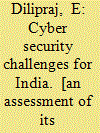

|
|
|
| 9 |
ID:
097846
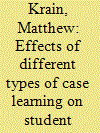

|
|
|
|
|
| Publication |
2010.
|
| Summary/Abstract |
Two types of case learning-case studies and problem-based learning-have become staples in our active learning international relations classrooms. Yet few teacher-scholars have examined whether different types of case learning yield different learning outcomes. This study examines the student engagement in response to four different types of case learning: case studies with texts designed for the case method, those using written nontraditional case materials, those incorporating documentary films as case materials, and problem-based learning approaches. I survey students in two International Political Economy classes as a way of yielding an indirect assessment of how effective or useful these different approaches are, and which types of case learning engaged students most. Results suggest that the types of case learning that engaged students' senses in multiple ways-problem-based learning and case studies using films as texts-enhanced their perceptions of the exercises' effectiveness. Case studies that relied on written texts alone were not rated as highly, although were still seen as extremely valuable. These results are consistent with the findings from the cognitive psychology literature that informs the active teaching and learning approach.
|
|
|
|
|
|
|
|
|
|
|
|
|
|
|
|
| 10 |
ID:
103473
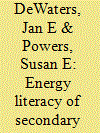

|
|
|
|
|
| Publication |
2011.
|
| Summary/Abstract |
Energy literacy, which encompasses broad content knowledge as well as affective and behavioral characteristics, will empower people to make appropriate energy-related choices and embrace changes in the way we harness and consume energy. Energy literacy was measured with a written questionnaire completed by 3708 secondary students in New York State, USA. Results indicate that students are concerned about energy problems (affective subscale mean 73% of the maximum attainable score), yet relatively low cognitive (42% correct) and behavioral (65% of the maximum) scores suggest that students may lack the knowledge and skills they need to effectively contribute toward solutions. High school (HS) students scored significantly better than middle school (MS) students on the cognitive subscale; gains were greatest on topics included in NY State educational standards, and less on topics related to "practical" energy knowledge such as ways to save energy. Despite knowledge gains, there was a significant drop in energy conservation behavior between the MS and HS students. Intercorrelations between groups of questions indicate energy-related behaviors are more strongly related to affect than to knowledge. These findings underscore the need for education that improves energy literacy by impacting student attitudes, values and behaviors, as well as broad content knowledge.
|
|
|
|
|
|
|
|
|
|
|
|
|
|
|
|
| 11 |
ID:
086479
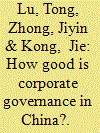

|
|
|
|
|
| Publication |
2009.
|
| Summary/Abstract |
Based on the revised OECD Principles of Corporate Governance of 2004 and China's regulatory framework, we develop a corporate governance index (CGI) to measure overall corporate governance and disclosure practices of the 100 largest listed companies in China. The results show that Chinese companies have been making progress in corporate governance reform and there is significant difference in CGI between the top and the bottom companies' performance. Among the six parts of CGI, Chinese listed companies perform better in disclosure and transparency, but show weakness in board of supervisor and stakeholders roles. Further tests show that the improvements in corporate governance of state-owned enterprises have resulted in some initial signs of success.
|
|
|
|
|
|
|
|
|
|
|
|
|
|
|
|
| 12 |
ID:
148106
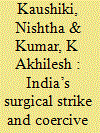

|
|
|
|
|
| Summary/Abstract |
India had been virtually driven to the wall in the wake of yet another terrorist attack on Indian army base in Uri. It has revived the memories of the Kaluchak and Pathankot attacks, and, 26/11. As India was caught unaware, it was probably believed by the government in power that an absolute majority in the Parliament and, after a stern warning after the Pathankot attack, Pakistan would probably not attempt any other mischief. While addressing a rally in Kerala, Prime Minister Narendra Modi stated that India will neither forget nor forgive the enormity of the Uri attack. This was also further followed by External Affairs Minister Sushma Swaraj’s evocative speech at the United Nations General Assembly (UNGA). However, the surgical strikes were unexpected given the policy of strategic restraint that India had followed in the past and indeed it was a resolute decision.
|
|
|
|
|
|
|
|
|
|
|
|
|
|
|
|
| 13 |
ID:
159613
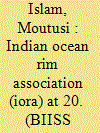

|
|
|
|
|
| Summary/Abstract |
The paper attempts to assess the performance of the Indian Ocean Rim Association (IORA) in the last 20 years since its birth in 1997 and foresees future challenges and opportunities for member states including Bangladesh. As a bridge between Asia and Europe, the Indian Ocean has become the new centre of global strategic and economic salience. IORA is the prime regional organisation devoted to the governance of this area. Despite its relative success, the potentials of IORA are believed to be remarkable. The organisation has provided a platform for cooperation in the areas of maritime safety and security, trade and investment facilitation, fisheries management, disaster risk management, academic, science and technology cooperation, tourism and cultural exchanges and blue economy, etc. Moreover, IORA has immense potential to become an effective regional forum, as observed in its 2017 Leaders’ Summit. However, the paper argues that vast area and diversity of the region, presence of numerous sub-regional and regional groupings, absence of influential leaders, exclusion of potential member states and lack of resources are some of the key challenges for IORA to become an effective regional organisation. At the end, the analysis exhibits some ways to strengthen IORA, i.e., increasing the role of major powers of the Indian Ocean littorals, creating a distinct identity, engaging the dialogue partners and greater grassroots involvement.
|
|
|
|
|
|
|
|
|
|
|
|
|
|
|
|
| 14 |
ID:
093825


|
|
|
|
|
| Publication |
2010.
|
| Summary/Abstract |
Today, analysts of the postmodern era recognize that worldwide conflicts are increasingly influenced by the interaction between terrorists, criminals, gangs, and private armies and that this interaction is a threat to the nation state. Now, a related threat is coming into play - one that involves all of these types of groups being represented at once in a single adversary. One such multifaceted group that is in the forefront is Los Zetas, a band of Mexican cartel enforcers that cannot be easily categorized, assessed, or targeted. Within broad categories of a multitude of irregular groups, Los Zetas embodies such capabilities as extensive compartmentalized networking, pervasive intelligence and counterintelligence capabilities, amassing of advanced weaponry, brutal tactics, top level military and police training, and the ability to undermine state governments and control large swaths of territory. Los Zetas, if left unchecked and unexamined, could potentially become a great security problem for Mexico, the US, and Central America. This essay provides an operational assessment that explores Los Zetas using various criteria traditionally used by nation state militaries, and more recently by Terrorism Early Warning Groups, to assess opposing forces (OPFOR). The purpose of this operational assessment is to provide a baseline understanding of Los Zetas that would make them less imposing and more targetable.
|
|
|
|
|
|
|
|
|
|
|
|
|
|
|
|
| 15 |
ID:
156136
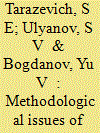

|
|
|
|
|
| Summary/Abstract |
The authors offer a methodological approach to assessing and verifying the safety of strategic missile systems (SMS) beyond their warranty life. The approach is based on the application of the developed methodological system of SMS safety principles, indicators, and criteria, and mathematical models of their assessment and forecasting, according to tests and operation results.
|
|
|
|
|
|
|
|
|
|
|
|
|
|
|
|
| 16 |
ID:
147787
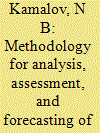

|
|
|
|
|
| Summary/Abstract |
This article focuses on the methodological aspects of analysis, assessment, and forecasting of external threats to the national security of the Russian Federation, as well as the role of the Armed Forces in its ensurance.
|
|
|
|
|
|
|
|
|
|
|
|
|
|
|
|
| 17 |
ID:
187206
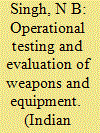

|
|
|
| 18 |
ID:
095296
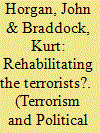

|
|
|
|
|
| Publication |
2010.
|
| Summary/Abstract |
Renewed interest on how and why terrorism ends has emerged in parallel with increased visibility of some new and innovative approaches to counterterrorism. These are collectively known, whether for good or bad, as "de-radicalization programs." However, and despite their popularity, data surrounding even the most basic of facts about these programs remains limited. This article presents an overview of the results of a one-year pilot study of select de-radicalization programs and investigates critical issues surrounding assessment of their effectiveness and outcomes. We argue that Multi Attribute Utility Technology (MAUT) may offer promise for future empirical assessment of what we prefer to designate "terrorism risk reduction initiatives." Perhaps less obviously, and until more data surrounding the efficacy of such initiatives becomes available, MAUT may also provide a conceptual basis for planning, evaluating, and guiding the development of future such initiatives and may have the unanticipated consequence of facilitating progress by encouraging greater exploration of efforts to change behavior from other contexts.
|
|
|
|
|
|
|
|
|
|
|
|
|
|
|
|
| 19 |
ID:
068948
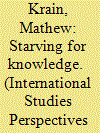

|
|
|
| 20 |
ID:
162300
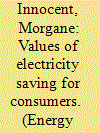

|
|
|
|
|
| Summary/Abstract |
This study aims at understanding the perceived value to consumers of practicing electricity saving. Based on an exploratory qualitative investigation and on two quantitative surveys, our study seeks to identify the values of electricity saving and model their relation with the intensity of electricity-saving behaviours. The results point to seven components of positive or negative assessments linked to the practice of electricity saving. These can be described in terms of environmental and citizen aspects, household management, feelings of well-being, secondary benefits, daily efforts, social consequences and lack of knowledge. Our results suggest that the main value lever of electricity-saving for consumers is more closely linked to well-being rather than environmental or money-saving concerns. These findings lead us to formulate new recommendations for public authorities to support their efforts in reducing residential electricity consumption.
|
|
|
|
|
|
|
|
|
|
|
|
|
|
|
|
|
|
|
|
|